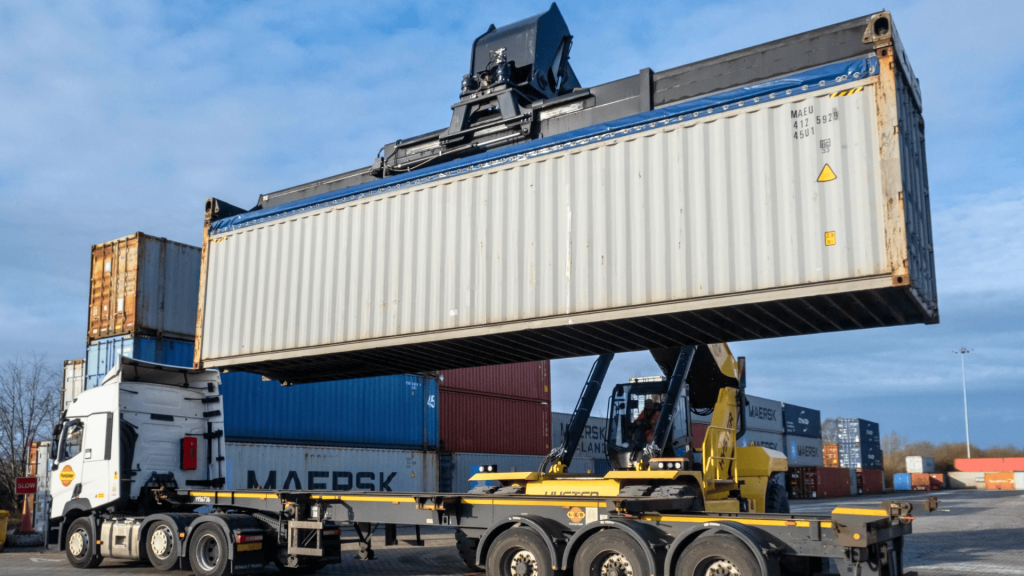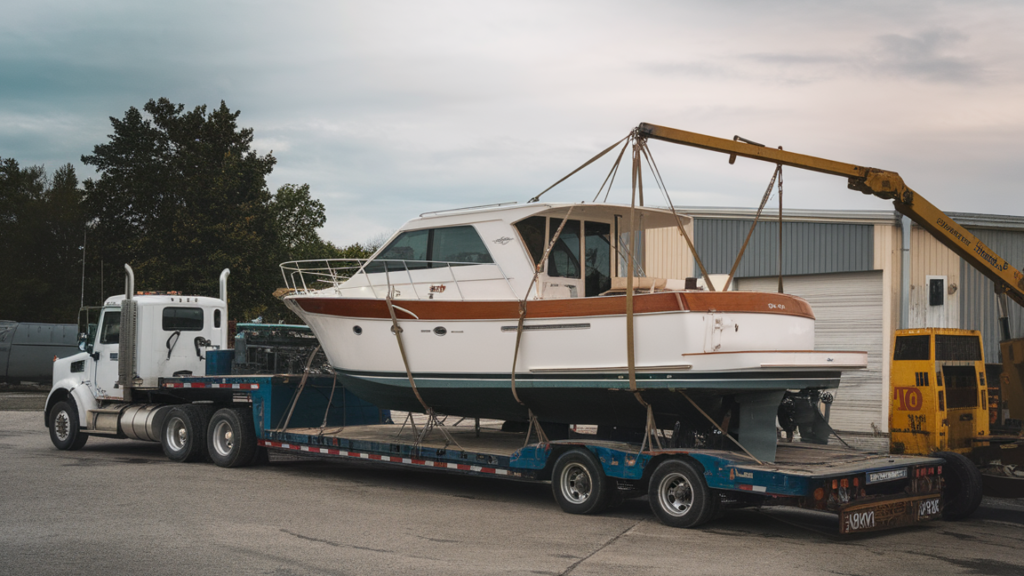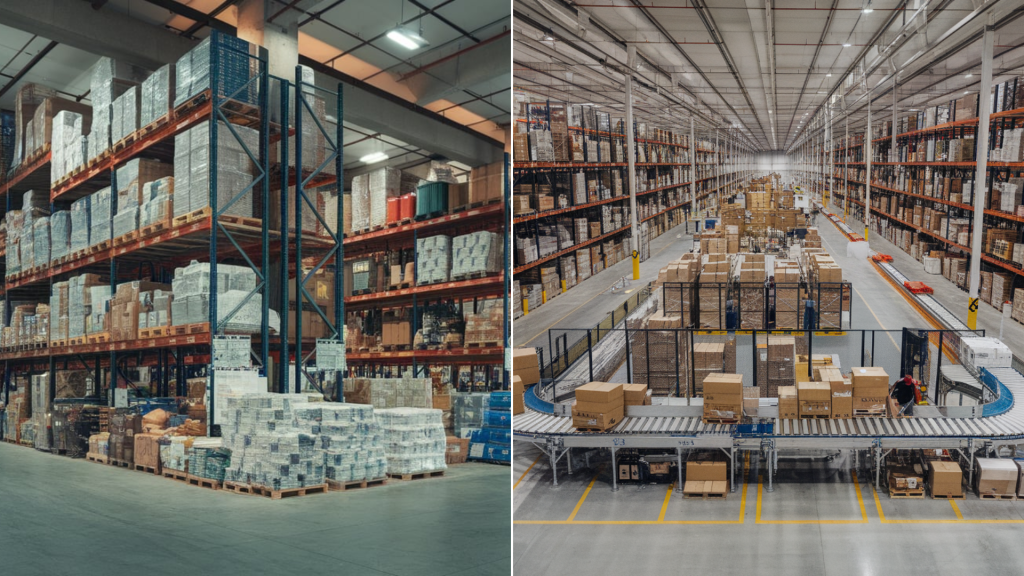Recently I learned that moving a shipping container isn’t nearly as simple as towing a trailer. These massive units can weigh tens of thousands of pounds, and you need far more than muscle to relocate them safely.
That’s why you’ll want the help of shipping container movers. They bring the right trucks, handle the heavy lifting, and take care of permits most people don’t even think about until it’s too late.
From my perspective, what makes this service so valuable is how much the details matter, everything from the ground at your site to the container size shapes the approach.
Want to see how it all comes together? Let’s start with a clear look at what shipping container movers actually do.
What are Shipping Container Movers?
When I first looked into moving a shipping container, I thought it was like hiring a normal moving truck. It’s not.
Shipping container movers are companies that specialize in picking up, hauling, and delivering large steel containers, whether they’re loaded or empty.
You’ll notice they’re different from a few other options you might come across:
- Container movers: These are the folks with the right trucks, trailers, and equipment to safely lift and transport containers. They handle short or long distances.
- Portable storage providers (like PODS or Pack-Rat): Instead of moving your own container, they rent you their own portable storage units and handle the drop-off and pickup. It’s more of a rental service than moving your personal container.
- Freight haulers: These are trucking companies that move cargo, usually stacked containers, at ports or across highways. They’re focused on large-scale freight shipping, not single personal containers.
The main thing to remember is this: if you already own a container, you’ll want a mover. If you just need storage while relocating, a rental company may be the simpler choice.
How Much Does It Cost to Move a Shipping Container?
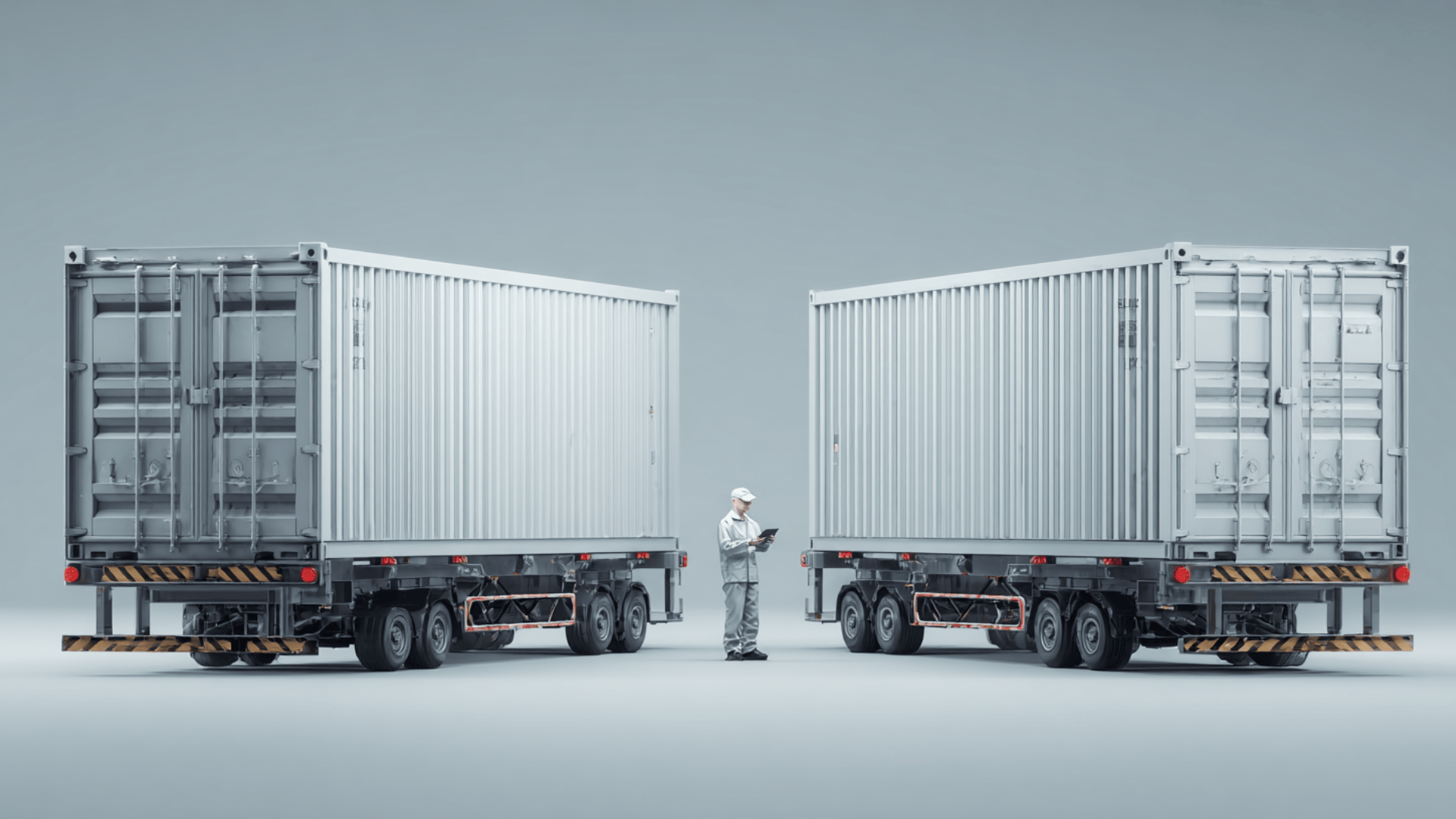
Money is usually the first thing people want to know about, and I was the same way. The truth is, the cost depends on the container size, the distance, and a few extra factors.
Cost by Container Size (20ft vs. 40ft)
Size matters a lot with container moving. Bigger boxes need more equipment, which raises the price.
- 20-foot container: Local moves often run between $500–$1,200. For distance pricing, you’ll usually see about $1.50–$3.00 per mile.
- 40-foot container: Long-distance jobs can land between $3,800–$7,200, depending on the route and setup. Some carriers post in-city rates of around $5 per mile for short hauls, but minimum charges still apply.
Quick note: The 40-footer almost always costs more once cranes, access issues, or permits come into play.
Local vs. Long-Distance Costs
Short hops are priced differently than state-to-state runs. Most companies charge a base fee plus mileage.
- Local/short distance: Expect a minimum trip charge plus mileage. For a 20-foot container, you’ll usually pay $500–$1,200 if access is simple.
- Long distance: Standard moves often run $1.50–$3.00 per mile. Oversize or complicated moves can climb as high as $10 per mile. Many full long-distance moves fall around $3,000–$5,000, but tough routes can hit $10,000 or more.
Quick note: Two moves of the same distance can be priced very differently once you add in permits, cranes, or escorts.
Factors That Affect Price
There are a few line items that really change the price. Below are the most common ones:
- Permits: Each state has size and weight limits. If your load goes over, you’ll need permits. Fees vary, but they’re almost always required for oversize containers.
- Escort vehicles: If the route calls for pilot cars, you’ll be paying per mile for each escort, which adds up fast.
- Cranes or lifting equipment: If a tilt-bed truck can’t do the job, you might need a crane. Hourly crane rentals can range from a few hundred to over a thousand dollars, depending on the size.
- Distance and route: Longer miles obviously add cost, but so do tricky routes with low bridges, narrow roads, or detours.
- Weight and load: An empty container is much easier and cheaper to move. A loaded one can push you into overweight territory, which means more permits and possibly a different type of trailer.
Quick note: The best way to get a real number is to give movers the details upfront; container size, loaded or empty, pickup and drop addresses, and site photos. That cuts down on surprise fees later.
DIY vs. Professional Shipping Container Movers
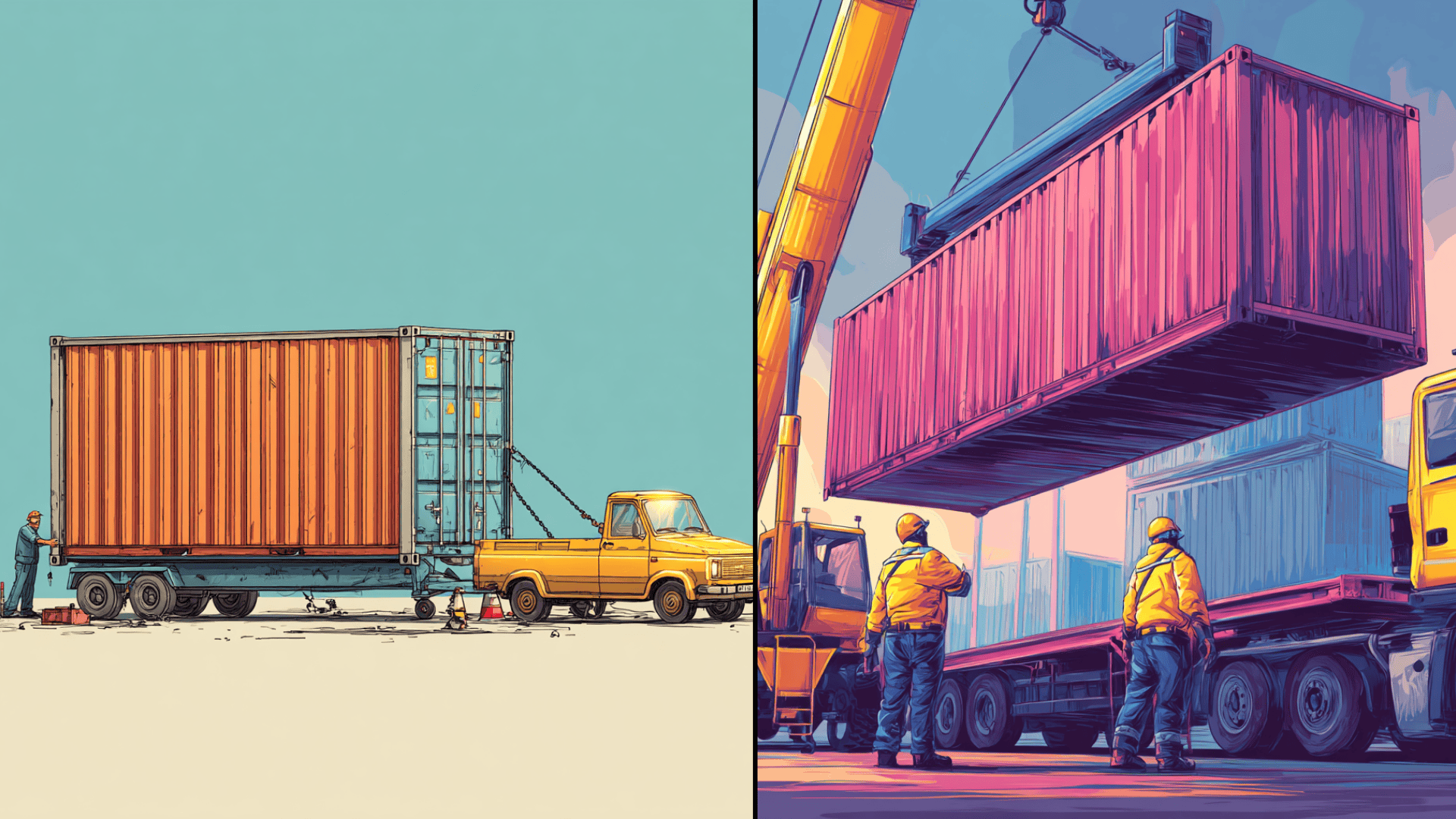
I’ve tried to move a container myself before, and I can tell you it’s not as easy as it looks. You’ve really got two choices: do it on your own with equipment you rent or own, or hire a company that handles the entire process. Let’s look at both.
DIY Methods (Equipment Needed, Safety Issues)
If you go the DIY route, here’s what you’ll usually need:
- A heavy-duty truck with the towing power to handle a container.
- A flatbed trailer or a tilt-bed trailer.
- Chains, straps, and rigging gear to keep the container secure.
- Possibly an excavator, forklift, or crane to lift and place it.
The biggest issue is safety. A loaded container can weigh over 30,000 pounds. One wrong move, and you risk damage to your property or worse, injury. Even empty containers are heavy enough to cause problems if you don’t have the right gear.
Professional Services (What They Include)
Hiring a pro means they bring everything you don’t have. They show up with trucks built to handle containers and the right loading equipment, whether that’s a tilt-bed trailer or a crane.
You’ll also get drivers and crews who know how to move containers safely. That’s something I really valued, having people on site who had done it hundreds of times before.
Most movers also carry insurance, so if something does go wrong, you’re not left covering the damage. And if your route needs permits, they’ll usually help with that too, which saves you a lot of hassle.
When I hired a mover, the whole process felt less stressful. They handled details I didn’t even know to think about, and that peace of mind was worth the price.
Pros and Cons of Each
Both options can work. What you go for depends on your budget, your timeline, and your comfort level.
| Option | Pros | Cons |
|---|---|---|
DIY |
Lower cost if you already own equipment | Risk of accidents or property damage |
| Flexible timing; you set the schedule | Extra costs for equipment rentals | |
| Hands-on control of the process | Permits and routing handled on your own | |
Professional |
Safer with trained crews | Higher overall price |
| Movers bring the right trucks and gear | Must follow the company schedule | |
| Insurance protectionFaster for long hauls | Less personal control over the move |
Takeaway: If you’re only moving an empty container a short distance and already have the right truck and trailer, DIY might be doable. But if it’s loaded, going far, or you don’t have heavy gear, hiring pros is usually the smarter move.
Types of Container Moving Services
Not every move looks the same. I know from experience that the way your container is handled depends a lot on distance, whether it’s full, and how complex the job is.
1. Local Moves
If you’re only shifting a container across town or to a nearby site, local moves are the easiest and most affordable. Movers often charge a base fee plus mileage, and the job is usually done in a single day.
This is common for construction sites, short-term storage, or moving between properties in the same area.
2. Nationwide / Cross-Country
Longer hauls are a different story. When you’re sending a container across states, the price is based heavily on mileage and permits.
These moves can take several days and often require more planning to handle routes, state rules, and timing. Professional movers take care of these details so you don’t have to.
3. Empty vs. Loaded Containers
An empty container is lighter and simpler to move, which makes it cheaper.
A loaded container, though, can weigh tens of thousands of pounds. That means you may need special trailers, overweight permits, and even escort vehicles.
If you’re keeping heavy items inside, expect higher costs and more coordination.
4. Specialized Hauling (Oversize, Multiple Containers)
Some jobs go beyond a single standard container. Oversized units, high-cube containers, or moves with multiple containers at once all fall under specialized hauling.
These need bigger trucks, sometimes cranes, and often pilot cars to meet highway rules. It’s the type of move where hiring an experienced hauler really pays off.
Top Shipping Container Moving Options

When I started looking into movers, I quickly saw there isn’t just one type of service. You’ve got a few main options, and each works best in different situations.
1. Container Haulers (Local Providers)
Local haulers are usually small companies that focus on short-range moves. They know the local routes and permit rules, which can save you time and hassle. I’ve found they’re often more affordable than nationwide services, especially if you only need to move a container a few miles.
One solid example is Container Transport, a U.S.-based company that handles local and nationwide container moves. They offer door-to-door service, including loading, off-loading, and even cross-border support for Canada and Mexico.
2. PODS vs. Pack-Rat (Portable Storage)
These companies don’t move your own container. Instead, they deliver one of their storage units to your site. You load it at your pace, and they’ll pick it up and deliver it to your new place or keep it in storage until you’re ready.
It’s convenient if you need both moving and storage, but it won’t help if you already own a shipping container.
3. Heavy Haulers & Specialized Transport
When you’re moving a container across state lines, or you’ve got an oversized or loaded unit, heavy-haul movers are the ones to call. They have the right trailers, cranes, and trained crews to handle big jobs safely.
It costs more, but it’s usually the only way to move large or complex loads without stress.
A good option here is Heavy Haulers, a nationwide company that manages the full process. They’ll plan the route, handle permits, provide the right equipment, and deliver your container on schedule
How to Contact a Mover
Before you reach out to companies like Heavy Haulers or Container Transport, it helps to have a few details lined up. Movers will ask for this right away, and having it ready saves time and avoids back-and-forth.
- Container size: Is it a 20-foot or 40-foot unit? Standard or high-cube?
- Loaded or empty: A loaded container adds weight, which changes equipment and cost.
- Pickup and delivery addresses: Exact locations matter for routing and permit checks.
- Site conditions: Is there room for a big truck? Any narrow roads, low wires, or soft ground?
- Timing: Do you need it moved right away, or do you have flexible dates?
With these details ready, movers can give you a faster and more accurate quote. It also shows them you’re prepared, which usually makes the process smoother.
How to Choose the Right Container Mover
I remember how overwhelming it felt choosing a mover. So many promised “fast and affordable” service, but what mattered was asking the right questions.
Start with experience. Container moving needs specialized trucks and skilled crews—daily experts avoid problems.
Check insurance and coverage. Heavy steel boxes carry risks, so proper protection brings peace of mind.
Value communication. Reliable movers respond quickly, explain clearly, and give sensible quotes. Vague or hard-to-reach companies are red flags.
Watch pricing transparency. Low quotes tempt, but ask what’s included—permits, cranes, or escorts can add up.
Finally, check reviews and reputation. Customer stories reveal whether promises and timelines are kept.
By weighing these factors, you’ll choose a mover who makes the process smooth and stress-free.
Wrapping Up
When I first looked into moving a shipping container, it felt overwhelming, but I quickly realized it mostly comes down to knowing what you need and matching it with the right solution.
Your best choice often depends on distance, whether the container is empty or loaded, and how much support you want from professionals.
From my experience, a reliable mover doesn’t just haul steel, they also manage safety, permits, and timing so everything runs smoothly.
You’ll also want to think about site access. I’ve seen even skilled movers struggle with tight driveways or low wires, so planning ahead saves you stress and money.
For more practical tips, check out my other blogs on moving, storage, and home projects.
